BegoodforBegoodat与Begoodto的区别
(精品)八年级英语上册一至三单元知识点小结(XX版新目标英语)154

八年级英语上册一至三单元知识点小结(XX版新目标英语)本资料为woRD文档,请点击下载地址下载全文下载地址 XX秋季新版八年级上册英语第一至三单元知识点小结 Unit1 wheredidyougoonvacation? .onvacation度假 vacation意为“假期、假日”,相当于holiday,但vacation表示长的假期。
如: thelongvacation长假 thesummervacation暑假 thechristmasvacation圣诞假期 而holiday(尤其美国)指“假日;休息日;休假”。
onvacation=onholiday意为“度假” 2.anythinginteresting一些有趣的东西 )something,anything,nothing,everything是指物的不定代词。
somebody,someone,anybody,anyone,nobody,everybo dy,everyone是指人的不定代词。
somewhere,anywhere,nowhere,everywhere是指地点的不定代词。
2)当形容词修饰something,anything,nothing,everything等不定代词时,放在这些词的后面; 3)这些不定代词做主语时,谓语动词用第三人称单数。
如: Iseverybodyhere?大家都到齐了吗? 4)something,somebody,someone,somewhere用于肯定句及表示请求或建议的疑问句中,而anything,anybody,anyone,anywhere用于否定句及疑问句中。
如: Didyoudoanythinginteresting?你做了有趣的事吗?(表疑问) whydon’tyouvisitsomeonewithme?你为什么不跟我一起去拜访下某个人呢?(表建议) 3.buysth.forsb.或buysb.sth 如:myparentsoftenbuysomebooksforme.=myparentsoftenbuym esomebooks. 我父母经常给我买书。
春人教新目标英语八年级下册Unit4单元知识点总结全解
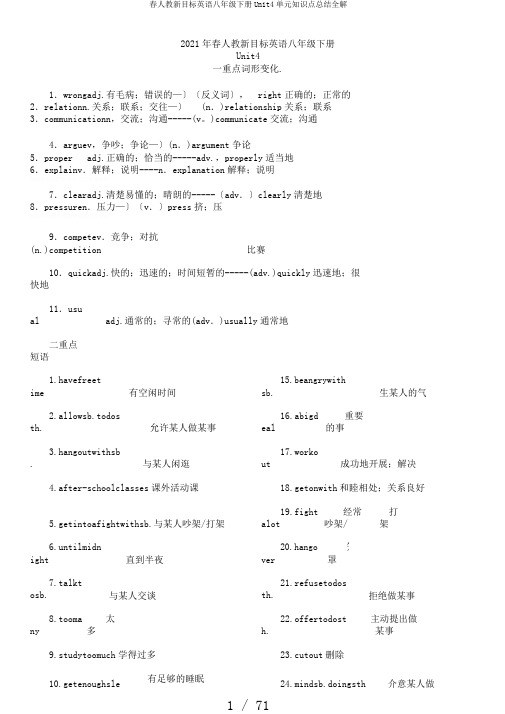
2021年春人教新目标英语八年级下册Unit4一重点词形变化.1.wrongadj.有毛病;错误的—〕〔反义词〕,right正确的;正常的2.relationn.关系;联系;交往—〕(n.)relationship关系;联系3.communicationn,交流;沟通-----(v。
)communicate交流;沟通4.arguev,争吵;争论—〕(n.)argument争论5.proper adj.正确的;恰当的-----adv.,properly适当地6.explainv.解释;说明----n.explanation解释;说明7.clearadj.清楚易懂的;晴朗的-----〔adv.〕clearly清楚地8.pressuren.压力—〕〔v.〕press挤;压9.competev.竞争;对抗(n.)competition比赛10.quickadj.快的;迅速的;时间短暂的-----(adv.)quickly迅速地;很快地11.usual adj.通常的;寻常的(adv.)usually通常地二重点短语1.havefreetime有空闲时间15.beangrywithsb.生某人的气2.allowsb.todosth.允许某人做某事16.abigdeal重要的事3.hangoutwithsb.与某人闲逛17.workout成功地开展;解决4.after-schoolclasses课外活动课18.getonwith和睦相处;关系良好5.getintoafightwithsb.与某人吵架/打架19.fightalot经常吵架/打架6.untilmidnight直到半夜20.hangover笼罩7.talktosb.与某人交谈21.refusetodosth.拒绝做某事8.tooma ny太多22.offertodosth.主动提出做某事9.studytoomuch学得过多23.cutout删除10.getenoughsle 有足够的睡眠24.mindsb.doingsth介意某人做ep.某事11.writesb.aletter给某人写信25municatewithsb.与某人交流12.callsb.up打给某人26.infuture今后13.surprisesb.令某人惊讶27.makesb.Angry使某人生气14.lookthrough浏览;翻看28.worryaboutsth.担忧某事29.copyone’shomework抄袭某人的作业36.freetimeactivities业余活动30.beoneself做自己37.getbettergrades取得更好的成绩31.familymembers家庭成员38.giveone’sopinion提出某人的观点32.spendtimealone单独消磨时光39.learnexamskills学习应试技巧33.givesb.pressure给某人施压40.practicesports体育训练34.haveafightwithsb.与某人吵架41.causestress造成压力35petewithsb.与某人竞争三重点句型:Myparentsdon’tallowmetohangoutwithmyfriends.我的父母不允许我和朋友一起闲逛。
人教版初中英语八年级上册期中考试复习知识点汇总

人教版初中英语八年级上册期中考试复习知识点汇总Unit1 Where did you go on vacation?词组:•go on vacation去度假•stay at home待在家里•go to the mountains去爬山•go to the beach去海滩•visit museums 参观博物馆•go to summer camp去参观夏令营•quite a few相当多•study for为……而学习•go out出去•most of the time大部分时间•taste good尝起来很好吃•have a good time doing玩得高兴•of course当然feel like给……的感觉;感受到•go shopping去购物•in the past在过去•walk around四处走走•because of因为•drink tea喝茶•find out找出;查明•go on doing继续•take photos照相•something important重要的事•up and down上上下下•come up 出来•buy sth. for sb. / buy sb. sth.为某人买某物•taste + adj. 尝起来……•look + adj. 看起来……•do nothin g…but+动词原形除了…之外什么都没有•seem+(to be)+ adj. 看起来……•arrive in+大地点/ arrive at+小地点get to /reach到达某地•decide to do sth.决定去做某事•forget doing sth.忘记做过某事•forget to do sth.忘记做某事•start doing sth.开始做某事•stop doing sth. 停止做某事•dislike doing sth. 不喜欢做某事•keep doing sth.继续做某事•Why not do. sth.?为什么不做……呢?•So +adj. + that+从句如此……以至于……•tell sb. (not) to do sth. 告诉某人(不要)做某事•enjoy doing sth.喜欢做某事知识点•1. on vacation 度假on vacation = on holiday 意为“度假”•2. anything interesting 一些有趣的东西•1)something,anything,nothing,everything是指物的不定代词。
高一英语必修一语法知识点总结

高一英语必修一语法知识点总结高一英语必修一语法知识点1高一英语必修一知识点总结:Unit11.be good to对……友好be good for对……有益;be bad to…/be bad for…2.add up加起来增加add up to合计,总计add…to把……加到……3.not…until/till意思是“直到…才”4.get sth/sb done使……完成/使某人被……5.calm down平静下来6.be concerned about关心,关注7.当while,when,before,after 等引导的时间状语从句中的主语与主句的主语一致时,可将从句中的主语和be动词省去。
While walking the dog,you were careless and it got loose.8.cheat in the exam考试9.go through经历;度过;获准,通过10.hide away躲藏;隐藏11.set down写下,记下12.I wo nder if…我不知道是不是…12.on purpose故意13.sth happen to sb某人发生某事sb happen to do sth某人碰巧做某事it so happened that……正巧碰巧14.It is the first(second…)that…(从句谓语动词用现在完成时)15.in one’s power处于……的控制之中16.It’s no pleasure doing…做…没有乐趣It’s no good/use doi ng sth.做某事是没好处/没用的17.She found it difficult to settle and calm down in the hiding place.it 做形式宾语18.suffer from患…病;遭受19.so…that…/such…thay…20.get tired of…对…感到劳累疲惫21.have some trouble with sb/sth.在……上遇到了麻烦22.get along with sb/sth.与某人相处23.ask(sb)for advice.(向某人)征求建议24.make后接复合宾语,宾语补足语须用不带to的不定式、形容词、过去分词、名词等。
杭州外国语学校初中英语七年级下册Unit 2知识点(答案解析)(1)
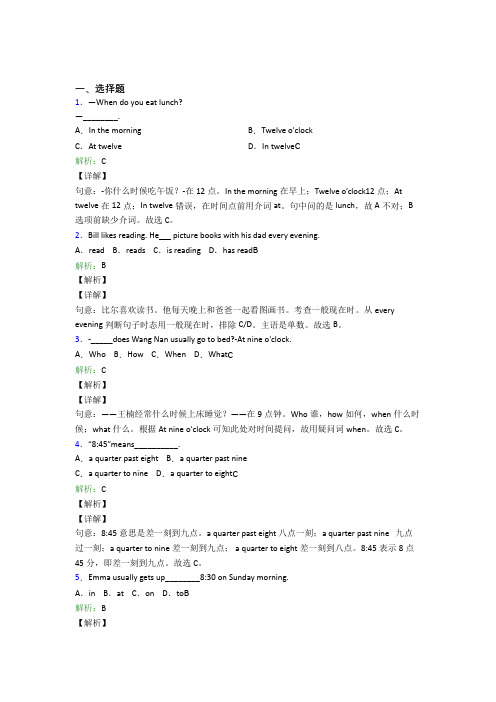
一、选择题1.—When do you eat lunch?—________.A.In the morning B.Twelve o'clockC.At twelve D.In twelve C解析:C【详解】句意:-你什么时候吃午饭?-在12点。
In the morning在早上;Twelve o’clock12点;At twelve在12点;In twelve错误,在时间点前用介词at。
句中问的是lunch,故A不对;B 选项前缺少介词。
故选C。
2.Bill likes reading. He picture books with his dad every evening.A.read B.reads C.is reading D.has read B解析:B【解析】【详解】句意:比尔喜欢读书。
他每天晚上和爸爸一起看图画书。
考查一般现在时。
从every evening判断句子时态用一般现在时,排除C/D。
主语是单数。
故选B。
3.-_____does Wang Nan usually go to bed?-At nine o'clock.A.Who B.How C.When D.What C解析:C【解析】【详解】句意:——王楠经常什么时候上床睡觉?——在9点钟。
Who谁,how如何,when什么时候;what什么。
根据At nine o'clock可知此处对时间提问,故用疑问词when。
故选C。
4.“8:45”means__________.A.a quarter past eight B.a quarter past nineC.a quarter to nine D.a quarter to eight C解析:C【解析】【详解】句意:8:45意思是差一刻到九点。
a quarter past eight 八点一刻;a quarter past nine 九点过一刻;a quarter to nine差一刻到九点; a quarter to eight差一刻到八点。
7年级下英语1-5知识点解析
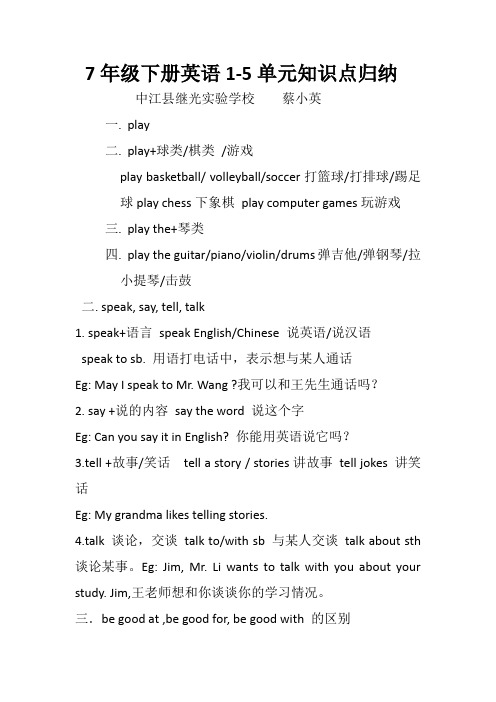
7年级下册英语1-5单元知识点归纳中江县继光实验学校蔡小英一.play二.play+球类/棋类/游戏play basketball/ volleyball/soccer打篮球/打排球/踢足球play chess下象棋play computer games玩游戏三.play the+琴类四.play the guitar/piano/violin/drums弹吉他/弹钢琴/拉小提琴/击鼓二. speak, say, tell, talk1. speak+语言speak English/Chinese 说英语/说汉语speak to sb. 用语打电话中,表示想与某人通话Eg: May I speak to Mr. Wang ?我可以和王先生通话吗?2. say +说的内容say the word 说这个字Eg: Can you say it in English? 你能用英语说它吗?3.tell +故事/笑话tell a story / stories讲故事tell jokes 讲笑话Eg: My grandma likes telling stories.4.talk 谈论,交谈talk to/with sb 与某人交谈talk about sth 谈论某事。
Eg: Jim, Mr. Li wants to talk with you about your study. Jim,王老师想和你谈谈你的学习情况。
三.be good at ,be good for, be good with 的区别1. be good at sth/ doing sth.擅长于…相当于do well in sth/doing sthEg: I am good at English.= I do well in English. 我擅长英语。
Tom is good at playing basketball.= Tom does well in playing basketball. Tom擅长打篮球。
good与well的区别运用

②.join in参加,加入某种活动。
May I join in your conversation?我可以加入你们的谈话吗?
(5)too, also与either的区别运用;
(6)play与乐器名称及球类名称连用冠词的用法;
→_______ _______is the meeting?
Ⅲ. hundred的两种用法
1. hundreds of+名词复数,“数以百记的,成百上千的,”表示一种“___________”;
2.数字+hundred+名词复数,“……百”,表示“___________”。
如:There are hundreds of people on the island.岛屿上有成百上千的人。
3)询问事件发生的年份、月份、日期等非非钟点性时间时,只能用when,而不能用what time。
e.g. —When is your birthday?—My birthday is February 6th.
—When is Teachers’ Day?—It’s September 10th.
(2)She walks to school.
=She goes to school_________ _________
重点语法
Ⅱ. how far与how long的区别
how far是提问两地之间的______,how long用来提问__________或某个事物的______。如:①It is five kilometers from my home to my school. (距离)
(5)基数Leabharlann 的构成与用法;Ⅰ. how引导的一般现在时态的特殊疑问句
2020年中考英语考点04 介词(解析版)
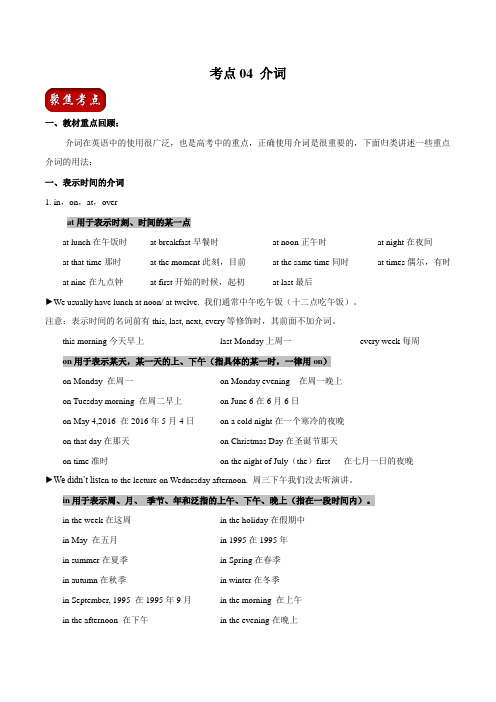
考点04 介词一、教材重点回顾:介词在英语中的使用很广泛,也是高考中的重点,正确使用介词是很重要的,下面归类讲述一些重点介词的用法:一、表示时间的介词1. in,on,at,overat用于表示时刻、时间的某一点at lunch在午饭时a t breakfast早餐时at noon正午时at night在夜间at that time那时at the moment此刻,目前at the same time同时at times偶尔,有时at nine在九点钟at first开始的时候,起初at last最后►We usually have lunch at noon/ at twelve. 我们通常中午吃午饭(十二点吃午饭)。
注意:表示时间的名词前有this, last, next, every等修饰时,其前面不加介词。
this morning今天早上last Monday上周一every week每周on用于表示某天,某一天的上、下午(指具体的某一时,一律用on)on Monday 在周一on Monday evening 在周一晚上on Tuesday morning 在周二早上on June 6在6月6日on May 4,2016 在2016年5月4日on a cold night在一个寒冷的夜晚on that day在那天on Christmas Day在圣诞节那天on time准时on the night of July(the)first 在七月一日的夜晚►We didn’t list en to the lecture on Wednesday afternoon. 周三下午我们没去听演讲。
in用于表示周、月、季节、年和泛指的上午、下午、晚上(指在一段时间内)。
in the week在这周in the holiday在假期中in May 在五月in 1995在1995年in summer在夏季in Spring在春季in autumn在秋季in winter在冬季in September, 1995 在1995年9月in the morning 在上午in the afternoon 在下午in the evening在晚上in the 21st century在二十一世纪in time及时in an hour一个小时后in a minute一会儿,立刻►The plane took off on time. 飞机准时起飞了。
中考英语高频词组
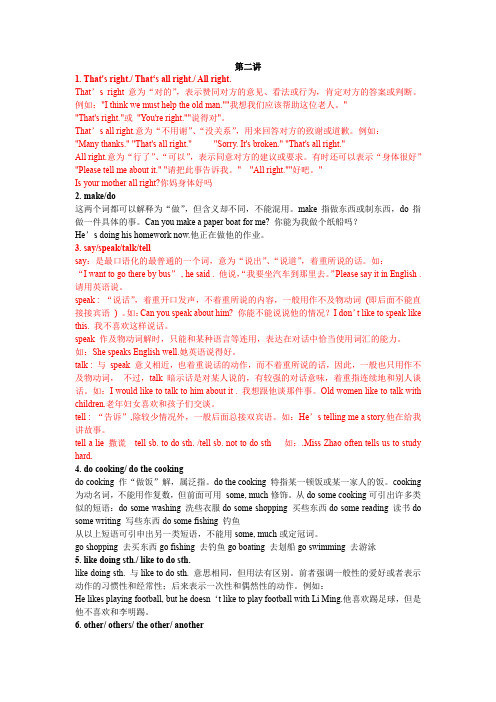
第二讲1. That's right./ That‘s all right./ All right.That’s right意为“对的”,表示赞同对方的意见、看法或行为,肯定对方的答案或判断。
例如:"I think we must help the old man.""我想我们应该帮助这位老人。
""That's right."或"You're right.""说得对"。
That’s all right.意为“不用谢”、“没关系”,用来回答对方的致谢或道歉。
例如:"Many thanks." "That's all right." "Sorry. It's broken." "That's all right."All right.意为“行了”、“可以”,表示同意对方的建议或要求。
有时还可以表示“身体很好”"Please tell me about it." "请把此事告诉我。
" "All right.""好吧。
"Is your mother all right?你妈身体好吗2. make/do这两个词都可以解释为“做”,但含义却不同,不能混用。
make指做东西或制东西,do指做一件具体的事。
Can you make a paper boat for me? 你能为我做个纸船吗?He’s doing his homework now.他正在做他的作业。
3. say/speak/talk/tellsay:是最口语化的最普通的一个词,意为“说出”、“说道”,着重所说的话。
如:“I want to go there by bus”, he said . 他说,“我要坐汽车到那里去。
外研社八年级上册英语 Module 1 词汇和语法基础(解析版)
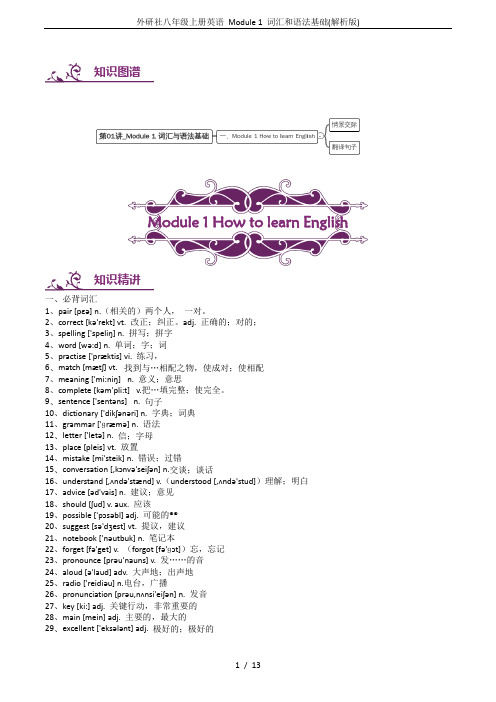
知识图谱Module 1 How to learn English知识精讲一、必背词汇1、pair [pεə] n.(相关的)两个人,一对。
2、correct [kə'rekt] vt. 改正;纠正。
adj. 正确的;对的;3、spelling ['speliŋ] n. 拼写;拼字4、word [wə:d] n. 单词;字;词5、practise ['præktis] vi. 练习,6、match [mætʃ] vt.找到与…相配之物,使成对;使相配7、meaning ['mi:niŋ]n. 意义;意思8、complete [kəm'pli:t]v.把…填完整;使完全。
9、sentence ['sentəns]n. 句子10、dictionary ['dikʃənəri] n. 字典;词典11、grammar ['ɡræmə] n. 语法12、letter ['letə] n. 信;字母13、place [pleis] vt. 放置14、mistake [mi'steik] n. 错误;过错15、conversation [,kɔnvə'seiʃən] n.交谈;谈话16、understand [,ʌndə'stænd] v.(understood [,ʌndə'stud])理解;明白17、advice [əd'vais] n. 建议;意见18、should [ʃud] v. aux. 应该19、possible ['pɔsəbl] adj. 可能的®®20、suggest [sə'dʒest] vt. 提议,建议21、notebook ['nəutbuk] n. 笔记本22、forget [fə'get] v. (forgot [fə'ɡɔt])忘,忘记23、pronounce [prəu'nauns] v. 发……的音24、aloud [ə'laud] adv. 大声地;出声地25、radio ['reidiəu] n.电台,广播26、pronunciation [prəu,nʌnsi'eiʃən] n. 发音27、key [ki:] adj. 关键行动,非常重要的28、main [mein] adj. 主要的,最大的29、excellent ['eksələnt] adj. 极好的;极好的30、agree [ə'ɡri:] vt. 同意;赞同31、quickly ['kwikli] adv. 迅速地;快地32、vocabulary [vəu'kæbjuləri] n. 词汇;词汇量33、natural ['nætʃərəl] adj. 合理的;合乎常情的34、improve [im'pru:v]vt. 改善,改进35、basic ['beisik] adj. 主要的;基础的36、time [taim] n. 回;次37、advise [əd'vaiz] vt.向…提出意见;忠告38、shy [ʃai] adj. 害羞的;腼腆的二、重点词汇1. suggest verb /səˈdʒest/to mention an idea, possible plan, or action for other people to consider提议;建议1). I suggested an Italian restaurant near the station for the party.我建议聚会去火车站附近的一家意大利餐馆。
初中英语常见词汇辨析

英语近义词辨析注意:“such+a/an +adj+可数名词单数形式”可与“so+adj+a/an+可数名词单数形式”转换。
She is such a kind girl.=She is so kind a girl.2.each和every注意:each不能与almost,nearly及not搭配使用,而every可以。
Almost every window was broken.Not every student went on holiday.Each不能用于否定句,在否定句中应用none。
None of the books are mine.H e lives alone but he doesn’t feel lonely.他独自生活,但并不感到孤独。
I t’s a lonely beach.那是一个人迹罕至的海滩。
4.stop doing sth与stop to do sth.English is one of my favorite subjects.One of my friends knows you.There are few eggs on the plate,so I must buy some.盘子里没几个鸡蛋了,所以我必须买一些There are a few eggs on the plate,so I needn’t buy any at once. There’s little milk in the glass.杯子里没多少牛奶了。
There’s a little milk in the glass.杯子里有一点牛奶。
我们班上任何人都知道这些歌手中的任何一个和他们歌曲中的任何一首。
这类形容词:interest和interesting、excited和exciting、surprised和surprisingThe boy was very excited when he heard the exciting news.Try做vi,意为“尝试、努力”I don’t think I can do it ,but I‘ll try.Try:做名词,”尝试”,have a try.“试一试”11.作“花费”:cost/spend/take /payI spent 200 yuan on a new coat.Don’t spend too much time watching TV.The dictionary cost me 89 yuan.It took Mr. Green an hour to finish his work yesterday.I paid 15 yuan for the pen .12.Through over acrossIt began to rain.However,we went out to look for the boy. You may be right but I don’t believe you.None of us went to the park.No one wants to leave.——who like that place?>——no one.Jim was writing a letter when I came in.另外,while 还可意为“而;然而”,表示两种情况的对比。
八年级英语(下)第4单元Section B知识详解新目标

Unit 4He said I was hard-working.Section B1.I’m good at speaking.我擅长口语。
be good at/ for/ to辨析:(1) be good at表示“在……方面(学得、做得)好,擅长于”。
如:He is good at Maths. 他数学学得好。
She is good at playing basketball.她擅长打篮球。
注:be good at≥do well inShe is good at English.≥She does well in English.be good for 表示“对……有益处(好处),有利于……”。
如:Taking a walk after supper is good for your health.晚饭后散步对你的健康有益。
注:be good for 的反义词组为be bad for。
如:Watching TV much is bad for your eyes.过多看电视对你的眼睛有害。
be good to 表示“对……和善(仁善)”,相当于be kind to 。
如:She is very good to her students. 她对她的学生很好。
注:to 后接动词原形,则表示“适于……”。
如:Is this water good to drink? 这水适于喝吗?(2) be good at 和do well in辨析be good at 擅长,较笼统地指某一方面有特长、很优秀。
do well in在……成绩好,在...做得好,在……表现好,指在具体某一次活动或某一件事情中做得好或做得出色或指学校功课、成绩好。
现以例子来说明它们意思的区别:You are good at English你英语好,你擅长英语。
You do well in English你英语成绩好(英语成绩好,并不表示你的英语就很好了,比如你在学七年级的英语时很刻苦,成绩好,但尽管你的成绩很好,但你不能说你英语就很好了,你不能说你擅长英语,毕竟你学的只是七年级的英语,另外,说不定会半途而废呢,说不定你八年级英语成绩很差呢。
begoodat的用法总结

be good at的用法总结
be good at意思是“擅长于……”,后跟名词、代词或动词ing形式。
be随着人称和时态的变化而变化。
如:He is good at English.他擅长英语。
扩展资料
1、be good at意为“擅长……”,表示“擅长于某一学科知识或技能”,也可表示“在……方面做得好。
后接名词、代词或V-ing形式。
例:I'm good at drawing。
我擅长绘画。
2、be good for意为“对……有好处、能”。
例:Running is good for your health.跑步对你身体有好处。
3、be good with意为“灵巧的';与……相处得好”。
例:He is very good with the children.他与这些孩子处得很好。
4、be good to意为“对……友好”。
to后一般接表示人的代词或名词,其中good可用friendly代替。
例:Miss Li is very good/friendly to us student.老师对我们学生非常好。
5、Be good!好好的!别淘气!听话,用于口语交流中。
例:I'll be good, I swear!我会听话的,我发誓!。
初一下英语常用语法知识——名词阶段练习(含答案)
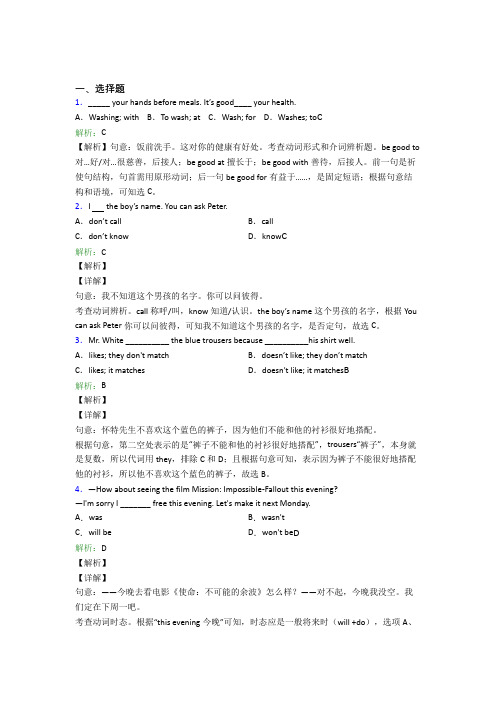
一、选择题1._____ your hands before meals. It’s good____ your health.A.Washing; with B.To wash; at C.Wash; for D.Washes; to C解析:C【解析】句意:饭前洗手。
这对你的健康有好处。
考查动词形式和介词辨析题。
be good to 对…好/对…很慈善,后接人;be good at擅长于;be good with善待,后接人。
前一句是祈使句结构,句首需用原形动词;后一句be good for有益于……,是固定短语;根据句意结构和语境,可知选C。
2.I the boy’s name. You can ask Peter.A.don’t call B.callC.don’t know D.know C解析:C【解析】【详解】句意:我不知道这个男孩的名字。
你可以问彼得。
考查动词辨析。
call称呼/叫,know知道/认识。
the boy’s name这个男孩的名字,根据You can ask Peter你可以问彼得,可知我不知道这个男孩的名字,是否定句,故选C。
3.Mr. White __________ the blue trousers because __________his shirt well.A.likes; they don't match B.doesn’t like; they don’t match C.likes; it matches D.doesn't like; it matches B解析:B【解析】【详解】句意:怀特先生不喜欢这个蓝色的裤子,因为他们不能和他的衬衫很好地搭配。
根据句意,第二空处表示的是“裤子不能和他的衬衫很好地搭配”,trousers“裤子”,本身就是复数,所以代词用they,排除C和D;且根据句意可知,表示因为裤子不能很好地搭配他的衬衫,所以他不喜欢这个蓝色的裤子,故选B。
英语核心词汇详解be good at for to with辨析

英语核心词汇详解be good at for to with辨析1、be good at (doing) sth.擅长于=do well in,后接技能、学科I am good at English,but Mary is good at maths.我擅长英语,但是玛丽擅长数学。
2、be good for ...对……有益与be bad for..(对......有害)是一对反义词be good for health 有益于健康Eating more vegetables is good for your health. 蔬菜对你的健康有好处。
Smokingis bad for your health. 吸烟对你的健康有害处。
3、be good with 对……有办法,善于应付……后接人或具体的事物,相当于get along withMary is good with old people. 玛丽和老人们相处的很好。
The new teacher is good with the children.新来的老师能和孩子们打成一片。
4、be good to 对…友好/有好处=be friendly toMy dad always says that we should be good to others.我爸爸总是说我们应该对别人友好。
三者都表示“参加”,区别如下:一、attend 指出席、参加较为正式的场合,如上课、讲座、报告、会议、婚礼等。
Tom has to attend lots of classes at weekends.汤姆周末要上很多课。
He did not attend the meeting yesterday.昨天他没有参加会议。
二、join 指加入某组织并成为其中一员。
固定搭配:join sb. in (doing) sth. 和某人一道做某事I will never forget the day when I joined the Party. 我永远也忘不了入党的那一天。
英语不熟练知识点梳理
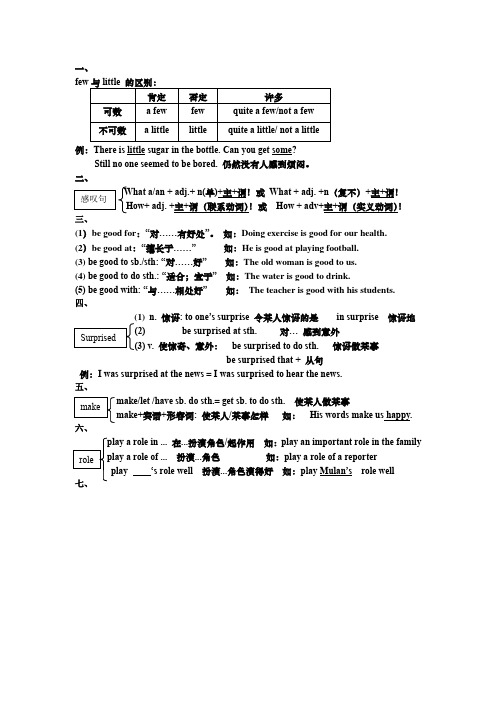
一、There is little sugar in the bottle. Can you get some?Still no one seemed to be bored. 仍然没有人感到烦闷。
二、What a/an + adj.+ n(单)+主+谓!或 What + adj. +n(复不)+主+谓! How+ adj. +主+谓(联系动词)!或 How + adv+主+谓(实义动词)! 三、(1)be good for :“对……有好处”。
如:Doing exercise is good for our health.(2)be good at :“擅长于……” 如:He is good at playing football.(3) be good to sb./sth: “对……好” 如:The old woman is good to us.(4) be good to do sth.: “适合;宜于” 如:The water is good to drink.(5) be good with: “与……相处好” 如: The teacher is good with his students. 四、n.惊讶: to one‟s surpri se 令某人惊讶的是 in surprise 惊讶地be surprised at sth. 对… 感到意外 使惊奇、意外: be surprised to do sth. 惊讶做某事be surprised that + 从句例:I was surprised at the news = I was surprised to hear the news.五、make/let /have sb. do sth.= get sb. to do sth. 使某人做某事 make+宾语+形容词: 使某人/某事怎样如: His words make us happy.play a role in ... 在...扮演角色/起作用如:play an important role in the family 扮演...角色如:play a role of a reporter play …s role well 扮演...角色演得好如:play Mulan‟s role well。
英语词法笔记
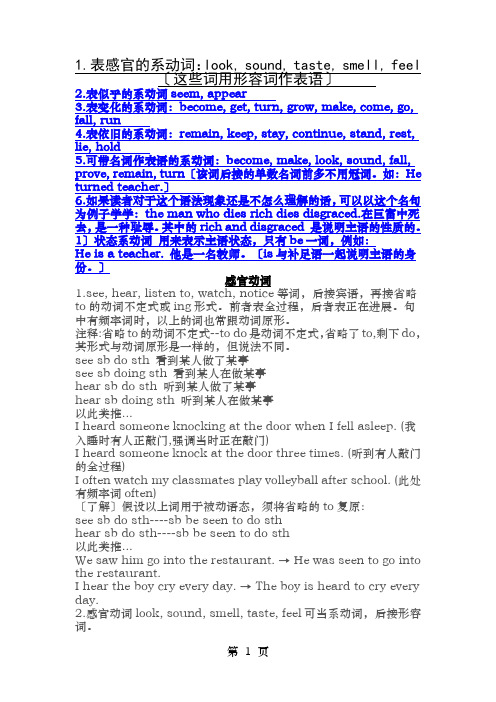
1.表感官的系动词:look, sound, taste, smell, feel〔这些词用形容词作表语〕2.表似乎的系动词seem, appear3.表变化的系动词:become, get, turn, grow, make, come, go, fall, run4.表依旧的系动词:remain, keep, stay, continue, stand, rest, lie, hold5.可带名词作表语的系动词:become, make, look, sound, fall, prove, remain, turn〔该词后接的单数名词前多不用冠词。
如:He turned teacher.〕6.如果读者对于这个语法现象还是不怎么理解的话,可以以这个名句为例子学学:the man who dies rich dies disgraced.在巨富中死去,是一种耻辱。
其中的rich and disgraced 是说明主语的性质的。
1〕状态系动词用来表示主语状态,只有be一词,例如:He is a teacher. 他是一名教师。
〔is与补足语一起说明主语的身份。
〕感官动词1.see, hear, listen to, watch, notice等词,后接宾语,再接省略to的动词不定式或ing形式。
前者表全过程,后者表正在进展。
句中有频率词时,以上的词也常跟动词原形。
注释:省略to的动词不定式--to do是动词不定式,省略了to,剩下do,其形式与动词原形是一样的,但说法不同。
see sb do sth 看到某人做了某事see sb doing sth 看到某人在做某事hear sb do sth 听到某人做了某事hear sb doing sth 听到某人在做某事以此类推...I heard someone knocking at the door when I fell asleep. (我入睡时有人正敲门,强调当时正在敲门)I heard someone knock at the door three times. (听到有人敲门的全过程)I often watch my classmates play volleyball after school. (此处有频率词often)〔了解〕假设以上词用于被动语态,须将省略的to复原:see sb do sth----sb be seen to do sthhear sb do sth----sb be seen to do sth以此类推...We saw him go into the restaurant. → He was seen to go into the restaurant.I hear the boy cry every day. → The boy is heard to cry every day.2.感官动词look, sound, smell, taste, feel可当系动词,后接形容词。
